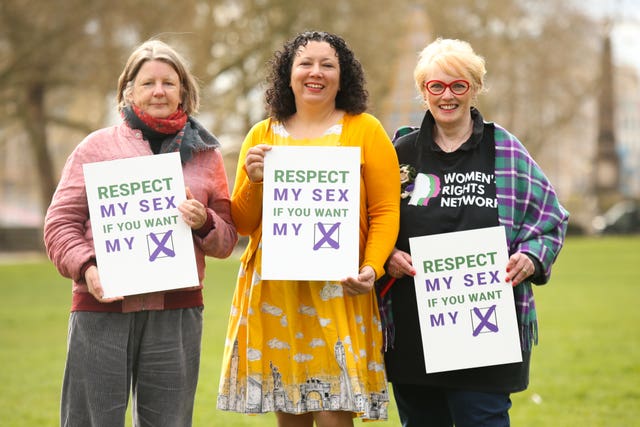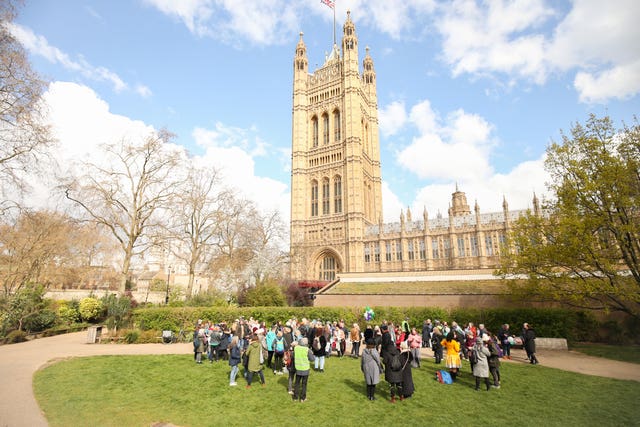
Around 100 “gender rights” activists have gathered in central London to say they are “not afraid to be women or to be called women” rather than “womb-havers”.
Wearing the purple, white and green of the suffragettes, they launched their new movement urging politicians to prioritise the protection of single-sex services and spaces.
Led by three main groups called Sex Matters, Women’s Rights Network, and Women Uniting, the activists said single-sex spaces which should exclude transgender women include sports competitions, toilets and some hospital wards.
 From left-right: Caroline Ffiske of Women Uniting, Maya Forstater of Sex Matters and Heather Binning of the Women’s Rights Network (James Manning/PA)
From left-right: Caroline Ffiske of Women Uniting, Maya Forstater of Sex Matters and Heather Binning of the Women’s Rights Network (James Manning/PA)
The campaigners said their movement is growing “exponentially” but has been largely underground and online until now.
Activists marched from the statue of Emmeline Pankhurst in Victoria Tower Gardens to a sculpture of Millicent Fawcett in Parliament Square, where they chanted the campaign slogan – “Respect my sex if you want my X” – which refers to drawing an X in the polling booth.
Maya Forstater, a tax expert who lost her job over her tweets about transgender people, was representing the group Sex Matters.
She said: “So many politicians, when they’re asked what a woman is, they’re not able to answer that simple question. They’re tying themselves in knots because they’re putting the feelings of men who identify as women ahead of women.
“When it comes to single-sex services, sports, child safeguarding, situations where sex really matters, they’re not able to bring policies that protect women and protect children, and protect trans people, because they’ve muddled up sex with the idea of gender identity.”
Also speaking in Parliament Square was Heather Binning, who said she wants “to see sex recognised”.
 The campaigns have largely been underground or online until now (James Manning/PA)
The campaigns have largely been underground or online until now (James Manning/PA)
She said: “We would like to see sex recognised and be able to speak about sex, and not be called ‘cervix-havers’, ‘womb-havers’ and all the things that some elements of society want to start introducing.
“We’re not afraid to be women, and we’re not afraid to be called women, and that’s what we want to get back to.”
Ms Binning said the group she represents, Women’s Rights Network, has 60 branches in the UK, each with around 1,000 members online.
She said: “Currently we’re a Twitter-based network. We’re just about the expand into the rest of the real-life world, and I think it’s going to be exponential.
“Most of the women here today, except for a handful, are anonymous.
“They cannot speak publicly because they are frightened for their jobs, that members of their family might disown them.
“They are being utterly silenced, and it’s miserable, feeling that way. Maya lost her job, and it’s not a joke, this is happening, for saying sex is real.
“The women coming forward, many are still afraid to come forward, but as they see people like me speaking out, this group meeting here, having this display of solidarity, we’re saying to them, ‘You can take the next step too because there’s more of us here than you think.'”
Caroline Ffiske, a former Conservative councillor and head of Women Uniting, a group of cross-party women, said she believes “it’s time to take this political issue out everywhere”.
She said: “Of the groups involved in this campaign, Women Uniting are the cross-party group – Lib Dem women, Labour women, Conservative women, Green, SNP – and what we’re saying is, these are the foundations of our society that are under attack.
“Sex is real, and it matters to the foundations of our society and how we live and orientate ourselves.
“Science is real and it matters.
“Truth is real, and free speech is real.
“We’ve put aside our political differences to campaign on this issue.”
Ms Ffiske also raised concerns about children transitioning, adding: “I just want to be absolutely clear that all of us are aware that we live in a free society, and that we all can identify how we like and express how we like.
“But when vulnerable children end up being put on a pathway to cross-sex hormones, they can be rendered sterilised, they can have their breasts removed, have their sex organs altered, and there are more and more de-transitioners who are saying: ‘I was too young to do this and now I have altered my body for life.'”



Why are you making commenting on The Herald only available to subscribers?
It should have been a safe space for informed debate, somewhere for readers to discuss issues around the biggest stories of the day, but all too often the below the line comments on most websites have become bogged down by off-topic discussions and abuse.
heraldscotland.com is tackling this problem by allowing only subscribers to comment.
We are doing this to improve the experience for our loyal readers and we believe it will reduce the ability of trolls and troublemakers, who occasionally find their way onto our site, to abuse our journalists and readers. We also hope it will help the comments section fulfil its promise as a part of Scotland's conversation with itself.
We are lucky at The Herald. We are read by an informed, educated readership who can add their knowledge and insights to our stories.
That is invaluable.
We are making the subscriber-only change to support our valued readers, who tell us they don't want the site cluttered up with irrelevant comments, untruths and abuse.
In the past, the journalist’s job was to collect and distribute information to the audience. Technology means that readers can shape a discussion. We look forward to hearing from you on heraldscotland.com
Comments & Moderation
Readers’ comments: You are personally liable for the content of any comments you upload to this website, so please act responsibly. We do not pre-moderate or monitor readers’ comments appearing on our websites, but we do post-moderate in response to complaints we receive or otherwise when a potential problem comes to our attention. You can make a complaint by using the ‘report this post’ link . We may then apply our discretion under the user terms to amend or delete comments.
Post moderation is undertaken full-time 9am-6pm on weekdays, and on a part-time basis outwith those hours.
Read the rules hereLast Updated:
Report this comment Cancel